Ecology
Ecology is the scientific study of the interactions between organisms and their environment. It encompasses the relationships between living organisms, such as plants, animals, and microorganisms, and their physical surroundings, including air, water, and soil. Understanding ecology is crucial for understanding the balance of nature and the impact of human activities on the environment.
Key Concepts in Ecology
- Levels of Organization: Ecologists study living organisms at different levels of organization, including individual organisms, populations, communities, ecosystems, and the biosphere.
- Abiotic and Biotic Factors: Abiotic factors are non-living components of the environment, such as temperature, light, and water. Biotic factors are living components, such as plants, animals, and microorganisms.
- Energy Flow: Ecologists study how energy flows through ecosystems, from producers (plants) to consumers (animals) and decomposers (bacteria and fungi).
- Nutrient Cycling: Nutrients, such as carbon, nitrogen, and phosphorus, cycle through the environment in processes like photosynthesis, respiration, and decomposition.
- Interactions: Ecologists explore the various interactions between organisms, including predation, competition, and mutualism.
- Human Impact: Understanding human impact on the environment, such as pollution, deforestation, and climate change, is a crucial aspect of ecology.
Study Guide
If you're studying ecology, here are some key topics to focus on:
- Describe the levels of organization in ecology and provide examples of each level.
- Explain the difference between abiotic and biotic factors, and give examples of each.
- Illustrate the flow of energy through an ecosystem, including the roles of producers, consumers, and decomposers.
- Discuss the importance of nutrient cycling in maintaining ecosystem balance.
- Provide examples of different types of interactions between organisms and explain their impact on the environment.
- Describe how human activities can affect the environment and discuss potential solutions to mitigate these impacts.
By mastering these key concepts, you'll have a solid understanding of ecology and its importance in the world around us.
.◂Science Worksheets and Study Guides Third Grade. Weather
Study Guide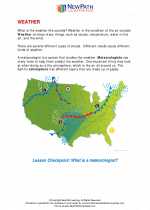 Weather
Weather  Worksheet/Answer key
Worksheet/Answer key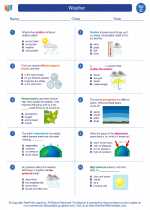 Weather
Weather  Worksheet/Answer key
Worksheet/Answer key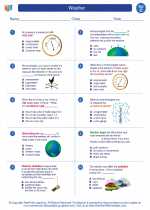 Weather
Weather  Worksheet/Answer key
Worksheet/Answer key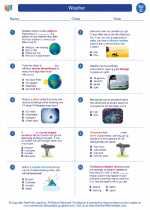 Weather
Weather  Vocabulary/Answer key
Vocabulary/Answer key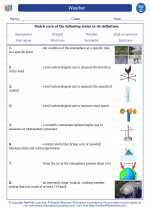 Weather
Weather  Vocabulary/Answer key
Vocabulary/Answer key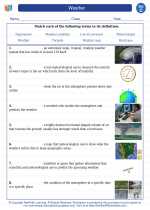 Weather
Weather 

 Worksheet/Answer key
Worksheet/Answer key
 Worksheet/Answer key
Worksheet/Answer key
 Worksheet/Answer key
Worksheet/Answer key
 Vocabulary/Answer key
Vocabulary/Answer key
 Vocabulary/Answer key
Vocabulary/Answer key

The resources above cover the following skills:
EARTH AND SPACE SCIENCE (NGSS)
Earth’s Systems
Students who demonstrate understanding can:
Represent data in tables and graphical displays to describe typical weather conditions expected during a particular season.